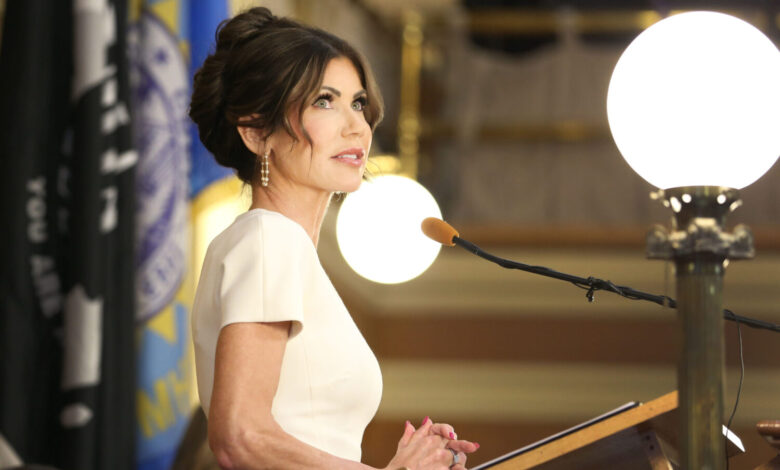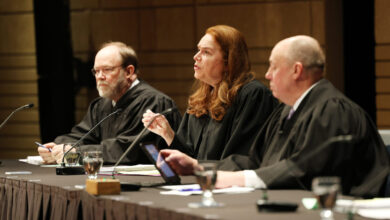Lawmakers grill South Dakota officials about Noem’s credit card use

Revelations about Republican former South Dakota Gov. Kristi Noem’s credit card use prompted a legislative oversight committee to question state officials Thursday in Pierre about how the state approves credit card spending for travel and other expenses.
The Dakota Scout obtained and published records earlier this year showing about $750,000 billed to the Noem office’s state-issued credit cards during her six years as governor, including travel expenses related to a book tour and a Canadian hunting trip, plus expensive stays at hotels such as The Venetian in Las Vegas. Noem resigned the governorship in January after she was appointed U.S. secretary of Homeland Security.
The governor’s credit card is intended to pay for travel-related expenses. Allowable expenses, said Bureau of Finance and Management Commissioner Jim Terwilliger, include flights, hotel rooms and meals.
Sen. Taffy Howard, R-Rapid City, who chairs the legislative Government Operations and Audit Committee, said she doesn’t view “several $500 charges for Sirius XM radio” as “allowable expenses.”
“The taxpayers have an issue with that. I have an issue with that,” Howard said.
Since the information was published, Terwilliger said the state canceled the satellite radio subscriptions and made internal policy changes for credit card expenses.
Many of the expenses related to the Governor’s Office credit cards come from security details ensuring the governor’s safety during travel, Terwilliger said. The state has since separated accounts between security and the governor’s other expenses to better track what costs are directly related to the governor’s spending.
Noem traveled to other states and Canada during her time as governor, sometimes appearing at campaign events supporting out-of-state Republicans or for President Donald Trump.
Lawmakers questioned if taxpayer-funded security detail should only be for state-related expenses, rather than campaign-related travel; how governor travel expenses are determined as a benefit to the state; and how many people in the Governor’s Office have a credit card, among other questions.
While Terwilliger said he doesn’t believe any of the credit card charges were campaign related, security for the governor is a “24/7, 365-day mission.” Security is provided by the state Highway Patrol. Terwilliger said he could not say how many people have access to one of the credit cards, saying it would provide information for “potential bad guys that want to do harm.”
Howard was not satisfied with the responses.
“It’s our job as legislators to set up parameters,” Howard said. “…Your answer cannot always, when legislators ask for an explanation, the answer cannot just be hiding behind security all the time. We have to figure out a way we can ask questions and get them answered without someone just saying, ‘Well, that’s security. You can’t know.’”
State Sen. Taffy Howard, R-Rapid City, listens to a presentation during a South Dakota legislative budget committee meeting on Jan. 15, 2025, at the Capitol in Pierre. (Joshua Haiar/South Dakota Searchlight)
State Sen. Taffy Howard, R-Rapid City, listens to a presentation during a South Dakota legislative budget committee meeting on Jan. 15, 2025, at the Capitol in Pierre. (Joshua Haiar/South Dakota Searchlight)
The State Auditor’s Office reviews the credit card charges once an invoice is submitted by the Governor’s Office. Auditor Rich Sattgast told lawmakers he has never denied a charge from the governor.
He said the Legislature could set stricter parameters on elected officials’ spending to improve oversight or limit spending.
“For the vast majority of elected officials, there has not been what would be seen by the public as an overstepping of their jurisdiction of spending money,” Sattgast said. “So I think having the public be aware of it and being accountable to the public is probably the primary aspect of it.”
Jenna Latham, with the Auditor’s Office, said the governor and some other elected officials can stay in expensive hotels because “they answer to the taxpayer.”
The office will occasionally question if an expense is allowable and ask for justification. Sometimes the expense will get scratched and covered by the individual, “but if they come back, you essentially have to approve it,” she said.
“There’s not much that can stop us,” Latham said, adding, “we have to follow the rules.”
Howard told lawmakers that they can propose legislation recommendations at the end of the year “if there’s different legislation that we think should be brought.”




